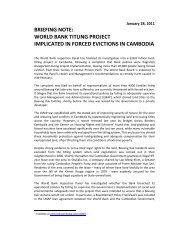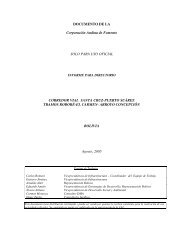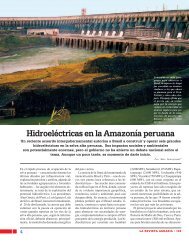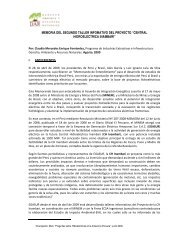The Real Cost of Power - Bank Information Center
The Real Cost of Power - Bank Information Center
The Real Cost of Power - Bank Information Center
You also want an ePaper? Increase the reach of your titles
YUMPU automatically turns print PDFs into web optimized ePapers that Google loves.
was not installed, and only that space has been allocated. Several categories <strong>of</strong> Indonesian steam coal contain close to<br />
18<br />
or more than 1% sulphur. <strong>The</strong> FGD units are known to reduce the mortality rates from SOX pollution significantly, yet<br />
19<br />
the Tata Mundra plant did not start with these. A large US study by the Clean Air Task Force found that in 2004,<br />
additional deaths due to fine particles from fossil fuel power plants in the US were nearly 24,000, which in the latest<br />
study came down to about 13,000 per year, mainly due to strict air-quality regulations and monitoring. A National<br />
20<br />
Academy <strong>of</strong> Sciences (USA) study found this coal-plant air pollution-related excess mortality to be as high as 20,000 in<br />
2009. And yet, the Tata Mundra/CGPL management have not installed all possible pollution prevention equipment.<br />
X. Massive contribution to Global Warming – In this age <strong>of</strong> extreme concerns about global climate change and its<br />
adverse effects, particularly on developing countries, pushing for massive coal-powered power plants runs contrary to<br />
these concerns. Particularly as coal is the dirtiest and most carbon-intensive energy source, and India is a party to<br />
international 'commitments' to reduce its emissions intensity by 25% in little over a decade. <strong>The</strong> total greenhouse gases<br />
emission from the Tata Mundra plant, based on Ernst and Young's estimated baseline CO emissions for the project,<br />
would be 30.796 million tonnes per year (baseline value), which would make it India's third largest emitter <strong>of</strong><br />
greenhouse gases. This would significantly increase the atmospheric carbon load, and put further pressure on our<br />
already vulnerable communities.<br />
XI. Impact on local economy, urban and rural – <strong>The</strong> fact-finding team also observed several visible impacts <strong>of</strong> this largescale<br />
industrialization on the local economy. <strong>The</strong>re were two visible trends <strong>of</strong> change. A small section <strong>of</strong> the urban<br />
moneyed class have benefitted from these industries – including the Tata Mundra power plant being set up – as hotels,<br />
car-hire, eateries, small supply, and small contracting businesses flourished. <strong>The</strong>re was a visible construction boom even<br />
in this remote corner <strong>of</strong> India. Particularly in the towns, we found those with additional investible resources, and the<br />
skills to adapt to new business opportunities, benefitted. On the other hand, almost all <strong>of</strong> the rural people have suffered<br />
adversely, as the natural resources they were dependent on for their traditional livelihoods and jobs have been either<br />
taken away or reduced and polluted/damaged.<br />
<strong>The</strong> primary economic benefit touted by both Tata Mundra and its lenders, that it will provide cheap electricity to local<br />
enterprises, thus making them more competitive, is not going to happen, with the Tatas now pressurizing the state<br />
governments and the Government <strong>of</strong> India to increase the basic tariff from the contracted Rs. 2.26 per kWh (unit) to<br />
21 22<br />
over Rs. 3.06 per unit, mostly on account <strong>of</strong> the sharp increase <strong>of</strong> the cost <strong>of</strong> imported coal. Inexplicably, the<br />
company had estimated the cost <strong>of</strong> imported coal to remain as low as about USD 36-37 per tonne in real terms, over<br />
the entire period <strong>of</strong> the plant's operating life! Furthermore, the failure <strong>of</strong> IFIs/FIs to question the absurdity <strong>of</strong> this<br />
economic assumption stands stark. Even as only the first Tata unit has just started generation, after accounting for the<br />
large transmission and distribution losses (Gujarat has a T&D loss figure <strong>of</strong> about 27%) and associated T&D<br />
infrastructure and management costs, this power is likely to be costlier than that even middle-class urban Gujaratis buy<br />
now. It is, therefore, likely to serve the interests <strong>of</strong> the well-heeled and other high-end commerce and industry only. At<br />
the same time, the thousands <strong>of</strong> fisher-folk in their bunders<br />
do not have any electricity connection, by way <strong>of</strong> denial <strong>of</strong><br />
recognition <strong>of</strong> their traditional rights, and by virtue <strong>of</strong> high costs, they will not have access to this new power too. On<br />
the contrary, their produce – fish, salt, milk, meat, etc. are seriously threatened and curtailed.<br />
XII. Women's safety, security, and free access to places – In fishing families, women work alongside men, in sorting,<br />
drying, and <strong>of</strong>ten taking the products to the market. Thus, free and safe access for women to all these areas is a<br />
precondition to their daily life and enterprise. In several fishing settlements around the Tata Mundra plant, the issue <strong>of</strong><br />
local women not being allowed to enter some areas was reported to the fact-finding team by these women themselves.<br />
<strong>The</strong> name <strong>of</strong> Tata's/CGPL's Korean Colony came up on a number <strong>of</strong> occasions, as a place unsafe for women and where<br />
incidents might have happened. Since the Tata Mundra UMPP is using many Korean-supplied machinery, there is a<br />
settlement <strong>of</strong> Korean workers. Some men folk also raised the issue <strong>of</strong> the presence <strong>of</strong> a large migrant labour force being<br />
a cause <strong>of</strong> concern for these women's safety. Instead <strong>of</strong> taking corrective measure in this regard, the company has<br />
decided to ban local women from entering some areas.<br />
XIII. Possible impacts <strong>of</strong> radioactivity from coal ash ignored – <strong>The</strong> IFC and the company have failed to take into account










